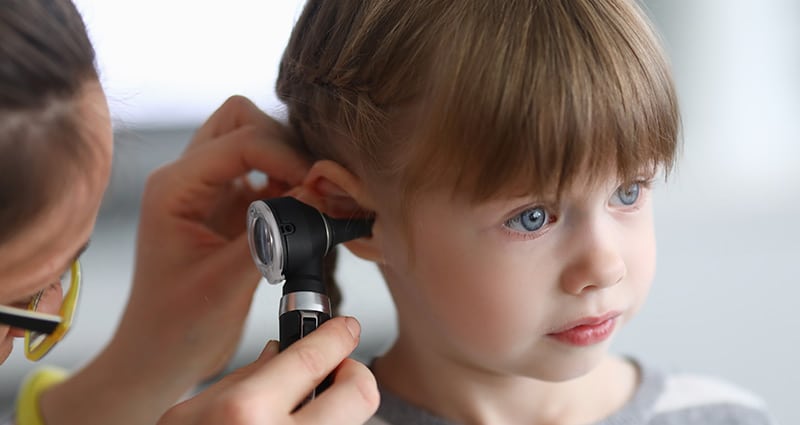Ear infections for kids seem to be inevitable. Five out of 6 children will get at least one ear infection by age 3.
Children have smaller, less developed ear tubes, which makes it hard to keep harmful germs out. As a parent, it’s important to know how to help your child if he or she develops an ear infection. Here are the answers to common questions parents have about ear infections.
Q. How Do I Know if My Child Has an Ear Infection?
Older children will be able to tell you if they have ear pain. It may be more difficult to notice an ear infection in a younger child. Watch if your child constantly rubs or tugs at one ear. Babies with ear infections may cry more than usual, especially at night and while nursing or sucking a bottle. Your doctor can confirm a diagnosis by looking for fluid and redness inside the ear and for other symptoms.
Q. How Are Ear Infections Treated?
Ear infections typically go away in a few days. Your pediatrician may suggest waiting for two to three days to allow symptoms to improve. Make sure your child gets plenty of rest and extra fluids. Older children can take over-the-counter medicine for pain or fever. If your child doesn’t feel better after a few days, your doctor may prescribe antibiotics. Talk to your doctor about further treatment if your child has several ear infections a year.
Q. Should My Child Go to School With an Ear Infection?
Thankfully, ear infections are not contagious. Children can return to school or activities when they feel better and if their fever subsides.
Q. Can I Prevent Future Ear Infections?
Some ear infections are difficult to prevent, but parents can take steps to help their children stay healthy. Make sure your child stays away from secondhand smoke. Secondhand smoke can prevent their ear tubes from working properly. Encourage your child to wash their hands regularly and avoid touching their face, which may deter bacteria that cause ear infections. Also, keep your child up to date with their yearly vaccines and flu shots. Finally, breastfeeding can give an infant valuable protection against ear infections. If possible, breastfeed your child until he or she is at least 12 months old.
Q. When Should We Seek Specialized Care?
Parents who may have experienced sinus or ear-related issues in the past may have been referred by their primary care provider to see an ENT (Ear, Nose and Throat) doctor. With their child suffering from ear infections, they may consider taking their child to see the ENT doctor, known as an otolaryngologist.
As a specialist, the pediatric otolaryngologist would be the doctor most qualified to treat issues related to your child’s ear, nose and throat. However, your child’s pediatrician is no stranger to the common illnesses children experience as they grow up, including ear infections. Discuss with your pediatrician whether a specialist is needed.
Q. When is it Time to Talk Ear Tube Surgery?
Ear tubes are tiny, metal tubes that help an ear drain liquids that can build up and cause ear infections. The insertion of the tubes is a surgical process that requires a small incision in the eardrum for placement.
If the child is suffering from frequent ear infections or has trouble hearing due to buildup in the ear, your child’s pediatrician may suggest ear tube surgery.
Q. How Many Ear Infections in One Year Before Seeing an ENT?
Your child’s pediatrician may suggest your child be seen by a pediatric otolaryngologist if the ear infections are particularly common (approximately occurring every other month) or severe (causing hearing loss). Each child’s case will vary.




